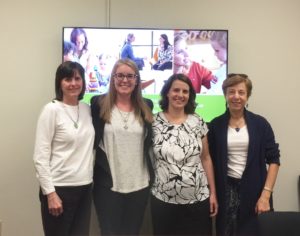M.S.W. student gains best of both worlds from advanced generalist program
by CSU MarComm Staff | May 12, 2017 9:40 AM
Story by Tricia Howley
Like many social work students, upcoming M.S.W. graduate Krystal Kneigge began her social work education not knowing exactly which direction she wanted to go in this field with an abundance of options.
“Since my senior year in high school I wanted to help and support people with mental health struggles, but I didn’t know which population I wanted to work with or what that career would look like,” Kniegge recalled.
Working with children
 [1]
[1]It was an undergraduate internship at a children’s mental health center that sparked an interest which has been guiding her ever since. “Working with children with significant emotional and behavioral needs solidified my passion for working specifically with young children,” Kniegge said.
For her M.S.W., Kneigge chose Colorado State University for its advanced generalist program. “I wanted an advanced degree that would not only prepare me for work with children and families, but also be flexible enough for work in a variety of settings, like mental health agencies, schools, and non-profit organizations,” Kniegge stated.
Yet a generalist approach to social work education has hardly prevented Kneigge from focusing on her specific interests. In fact, she’s been able to create opportunities to support her passion for early childhood mental health. The M.S.W. program traditionally requires a capstone group project, but Kneigge chose to do a thesis with the support and guidance of her faculty advisor, Assistant Professor Paula Yuma.
A unique approach to the M.S.W.
“Dr. Yuma spent a year guiding me through the thesis-writing process, helping me refine my research, and providing me with lots of encouragement throughout the project,” Kniegge said. “I am so grateful for her guidance and support. This was my first experience conducting research, and it was a challenging but rich experience.”
Kniegge researched Early Childhood Mental Health Consultation, or ECMHC, for her thesis, and used data collected from her most recent field internship placement, where she felt challenged to expand her perspective on work with families, and to embrace a more systems- and strengths-based approach.
“I wanted to understand this intervention better, specifically looking at how it is experienced by the people who receive it,” Kniegge stated. “I had seen some challenges from my perspective as a consultant, and I wanted to understand how these challenges were experienced by the teachers, since their receptiveness to the intervention significantly impacts its outcomes.”
ECMHC is service that many mental health agencies across the country have begun providing to child care centers, where an early childhood mental health professional partners with teachers, directors, and families, to support these adults in learning how to address challenging child behaviors, and promote children’s social and emotional development.
“For my thesis, I interviewed a number of teachers and used their input to inform my research on ECMHC. I was also able to report the general findings back to my internship so that they could better understand this experience from teachers’ perspectives, and use this information to inform their future practice with teachers,” Kniegge said.
While Kniegge’s passion, along with the willingness of her field placement agency and department faculty to support her ambitions, enabled her to highlight specific interests while completing her M.S.W., she still values the advanced generalist degree for ensuring students have as broad a learning experience as possible.
“This degree is unlike most graduate degrees in that it has a number of focus areas: community work, clinical work, policy work, and research,” Kneigge said. “If you’re looking to gain education and experience that prepares you for human services work in a variety of settings with a variety of populations, an M.S.W. is definitely the way to go.”
Following her heart
When she graduates this month, Kniegge’s first priority will be continuing to follow her heart. “I love partnering with children, families, and educators in school and classroom environments, so I have accepted a job as a school social worker at an alternative school for children with significant autism and emotional disabilities,” she said.
“I’m planning on pursuing my clinical license and eventually helping to train upcoming clinicians, as I also have a passion for teaching,” added Kniegge. “I also have a long-term dream of caring for children in the foster care system, perhaps facilitating a therapeutic foster home for children with significant support needs.”
Judging by how Kniegge used her passion for working with young children to pursue the M.S.W. program’s coursework, field internship work, and research, plus a graduate-level thesis project on her own terms, those plans and dreams are more than likely to come true.
The School of Social Work[2] is part of Colorado State University’s College of Health and Human Sciences[3].
- [Image]: http://source.colostate.edu/wp-content/uploads/2017/05/SSW-krystal-msw-thesis-original.jpg
- School of Social Work: http://www.ssw.chhs.colostate.edu/
- College of Health and Human Sciences: https://www.chhs.colostate.edu/
Source URL: https://source.colostate.edu/m-s-w-student-gains-best-worlds-advanced-generalist-program/
Copyright ©2024 SOURCE unless otherwise noted.